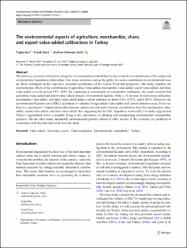The environmental aspects of agriculture, merchandize, share, and export value-added calibrations in Turkey
Özet
The intricacy associated with policy design for environmental sustainability has necessitated a reconsideration of the output and
environmental degradation relationship. Like many economies across the globe, the sector contributions to environmental woe
are likely contingent on the respective economic performance of the sectors. From this perspective, this study examines the
environmental effects of the contributions of agriculture value-added, merchandize value-added, export value-added, and share
value-added over the period 1991–2019. By employing a combination of econometric techniques, the result revealed that
agriculture value-added and export value-added mitigate environmental hazards, while a 1% increase in total energy utilization,
merchandize value-added, and share value-added induce carbon emission by about 0.6%, 0.02%, and 0.001%. Moreover, the
environmental Kuznets curve (EKC) hypothesis is validated for agriculture value-added and carbon emission nexus. However,
there is a significant U-shaped relationship between carbon emission and economic contributions from the merchandize valueadded, export value-added, and share value-added, thus suggesting that the EKC hypothesis is not valid. The study suggests that
Turkey’s agricultural sector is possibly living to the expectation of adopting and incorporating environmental sustainability
practices. On the other hand, sustainable environmental policies related to other sectors of the economy are proffered in
consonance with the indicated result from the study.
Cilt
28Sayı
44Bağlantı
https://hdl.handle.net/11363/5149Koleksiyonlar
Aşağıdaki lisans dosyası bu öğe ile ilişkilidir:


















